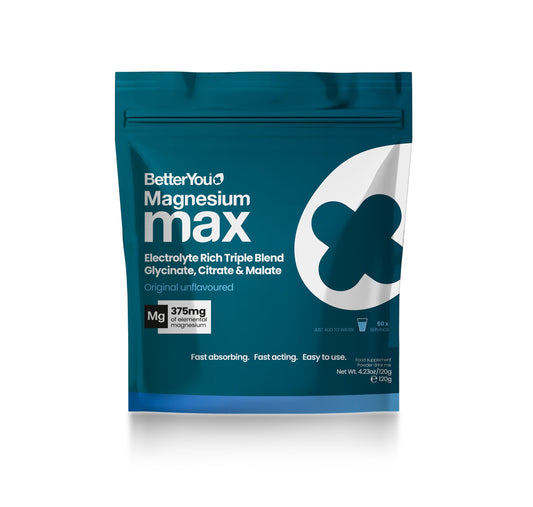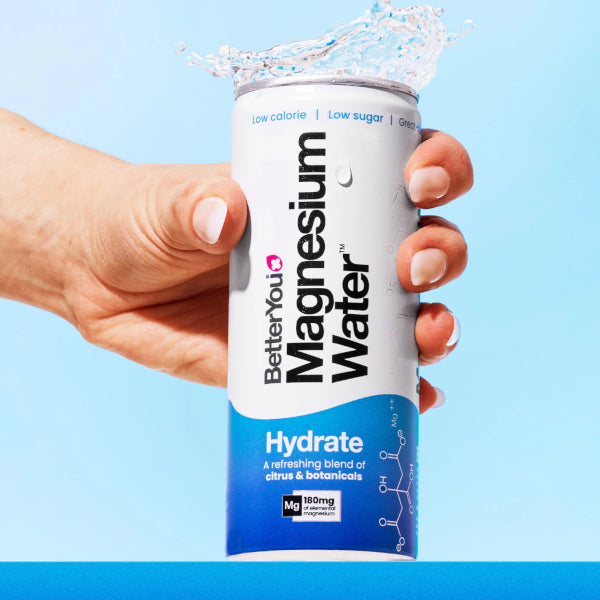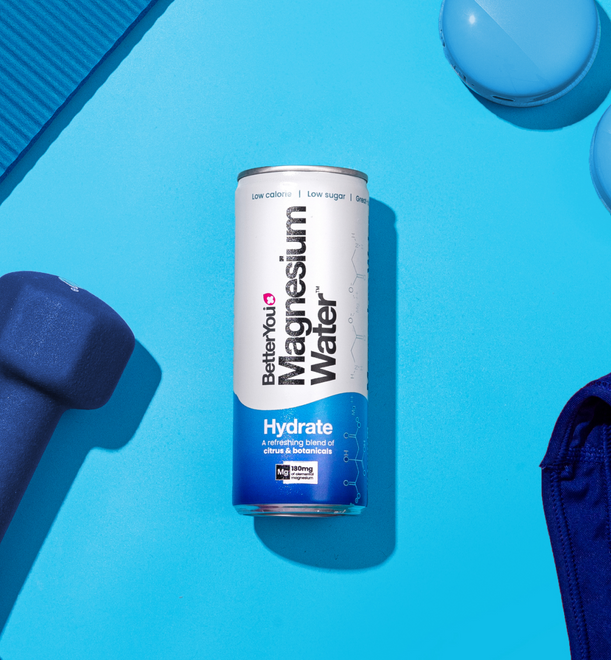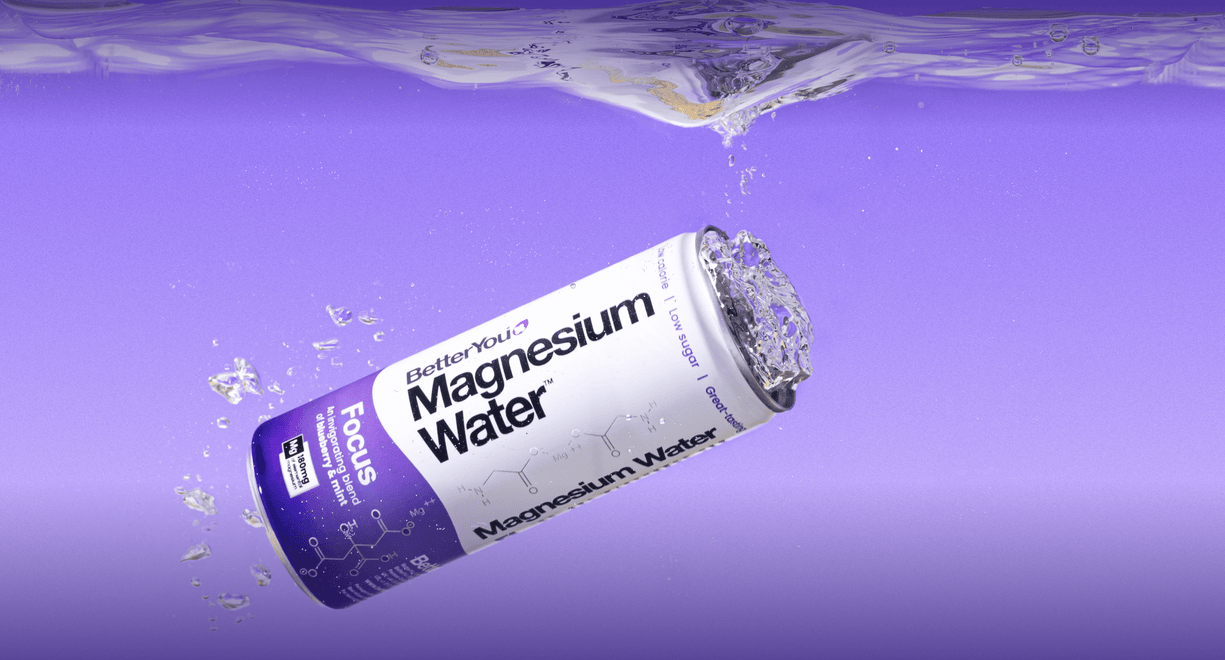Our bodies use calcium and Magnesium in tandem to support hundreds of essential body functions, so it’s important to keep up optimal levels of these two key minerals. From supporting bone health, and aiding restful sleep, to promoting healthy muscle function and energy levels—supplementing Magnesium with calcium is the most effective method of increasing your mineral intake.
Read on as we explain the core benefits of Magnesium and calcium and how they keep your body healthy, as well as why Magnesium is key to how your body uses calcium. We’ll also cover how to ensure you’re getting enough of each mineral via food and supplements.
In this guide:
- What is calcium and Magnesium good for?
- Why calcium needs Magnesium to be effective
- How your body absorbs Magnesium and calcium
- Factors that affect mineral absorption
- Knowing what foods to eat
- Types of supplements, everything you need to know
- What causes Magnesium and calcium deficiency?
- Possible side effects of Magnesium and calcium supplements

What is calcium and Magnesium good for?
Magnesium
Aside from strengthening your skeleton, Magnesium is used in over 300 functions within the body. Magnesium supplements can help bones form and remain strong. It enables the small mineral crystals that comprise part of your bone structure to increase in density and gain strength. Magnesium helps your bones to absorb calcium more readily.
Key benefits of Magnesium include:
- Establishing a natural energy boost thanks to energy-yielding metabolism
- Healthy muscle function and relief of muscle tension
- Electrolyte balance
- Sleep and relaxation
- Routine functioning of the nervous system
- Protein synthesis
Shop our Magnesium supplements
Calcium
Of all the essential minerals found in your body, calcium is the most abundant. Nearly all of your calcium is stored in your bones and teeth.
Like Magnesium, calcium is vital to bone health. It enables bones to develop and grow, keeping them strong and dense up to the age of around 25. After 25 your bones begin to lose density as part of the ageing process. Calcium helps slow this decline.
Calcium also contributes to:
- Muscle function
- Normal blood clotting
- Neurotransmission (nerve cells passing signals to each other)
- Digestive enzyme function
Why calcium needs Magnesium to be effective
Your body doesn’t rely on Magnesium to absorb calcium. But without it, calcium can become toxic, depositing itself in soft tissues, kidneys, arteries and cartilage rather than in bones where it has the greatest benefit. Balancing the right amount of calcium and Magnesium can help prevent potentially harmful health issues.
1. Magnesium is good for maintaining a balance of hormones
Having too much calcium in your blood stimulates your body to release a hormone called calcitonin. It also prevents your body from secreting the parathyroid hormone (PTH).
- Calcitonin—causes your bones to absorb more calcium, but limits how much goes into your soft tissues.
- PTH—draws calcium out of the bones and deposits it in the soft tissues.
Your body must be able to regulate the balance of these hormones, which is what Magnesium is good for. Keeping up sufficient levels of Magnesium is good for suppressing PTH and stimulating calcitonin. This sends calcium to the bones rather than the soft tissues and can help to prevent certain bone diseases. Bone diseases can be common in seniors, but maintaining optimal Magnesium levels can help support bone health.
Shop our range of bone health supplements
2. Magnesium is good for regulating the heartbeat
Calcium makes muscles contract, while Magnesium is good for relaxation—which is why Magnesium is good for sleep. Together, the two minerals regulate your heartbeat. Electrical impulses provoke the calcium within the cells of your heart muscle, stimulating a contracting movement.
3. Magnesium helps enzymes convert vitamins to facilitate calcium absorption
While Magnesium can help your cells and muscles to relax, your body also needs two key vitamins to absorb calcium properly:
- Vitamin D — certain enzymes in your body require Magnesium to be able to convert vitamin D into its active form (known as calcitriol).
- Vitamin K (K1 and K2)— these promote the calcification of bones and prevent blood vessels and kidneys from calcifying.
How your body absorbs Magnesium and calcium
You can get Magnesium and calcium from foods and supplements. The different forms of supplements include:
- Oral supplements — those you take by mouth, such as tablets.
- Transdermal supplements — those you absorb through the skin, such as lotions and sprays.
When you eat Magnesium-rich foods, the minerals pass through parts of your body known as the gastrointestinal tract, including your:
- Mouth
- Throat
- Stomach
- Small intestine
- Large intestine
Transdermal supplements, on the other hand, absorb directly into your skin, bypassing the digestive system and ensuring your body absorbs optimal levels of Magnesium.
How effectively your body absorbs and retains a mineral is dictated by that mineral’s bioavailability. This means:
- How much of it you take in overall, through food and supplements
- The health of your gastrointestinal tract
- Your everyday diet
Magnesium’s bioavailability varies from supplement to supplement. Studies have found that Magnesium chloride is more bioavailable than Magnesium oxide and Magnesium sulphate.
Since your body can absorb Magnesium chloride more effectively, that's why it's the only format we use across our transdermal Magnesium range.
Calcium absorption varies. On average, our bodies absorb around 30% of our overall intake. This is why the recommended advice is often to take smaller doses of calcium several times a day rather than a single large dose - if you need to supplement calcium at all.
Learn more about the benefits of transdermal Magnesium supplementation
Factors that affect mineral absorption
1. Consuming certain foods and drinks
Your regular weekly diet might affect how well your body absorbs minerals. To help inform your choices, here’s a selection of food recommendations that we should all look to reduce. Always talk to a healthcare professional before cutting a food group out of your diet.
Food that may be affecting your mineral intake includes:
- Too much red meat
- Too much salt
- Processed fats
- Refined sugars
- Alcohol
- Caffeine
- Soft drinks
- Foods high in oxalic acid (such as spinach, rhubarb and chocolate)
2. Digestive problems
If you have low levels of gastric acid or suffer from digestive complaints, such as IBS, your body may not be able to fully absorb Magnesium or calcium.
For maximum absorption, it’s recommended that you take calcium supplements with food.
3. Ageing
As you get older, your body releases calcium through sweat, skin cells and waste. For this reason, calcium absorption can vary depending on how old you are.

Knowing what foods to eat
A diet rich in both calcium and Magnesium is good for a range of health benefits.
Magnesium
Food sources that contain high levels of Magnesium include:
- Brown rice
- Seafood
- Dark green vegetables (e.g. spinach)
- Legumes (e.g. lentils, split peas, tofu)
- Beans (e.g. black, kidney, edamame)
- Nuts (e.g. almonds, cashews, Brazil nuts)
- Seeds (e.g. sunflower, sesame, pumpkin)
- Buckwheat
- Wholegrain cereals
Calcium
The following foods and drinks are rich sources of calcium:
- Milk (including soy milk)
- Cheese
- Yoghurt
- Nuts (e.g. pistachio, almonds, hazelnuts)
- Sesame seeds
- Beans
- Broccoli
- Cabbage
- Spinach and kale
- Turnips
- Tofu
- Many fortified breakfast cereals
Types of supplements, everything you need to know
What to take
Calcium and Magnesium supplements are available in a wide range of forms, including pills, capsules and tablets, and sprays. However, that’s not all. There are also various types of transdermal supplements available too, which can help make taking Magnesium easier to supplement for all ages.
Boosting your minerals using transdermal supplementation means it can be absorbed effectively through your skin, so you don’t have to ingest them.
BetterYou Know
Try to avoid carbonates (i.e. Magnesium carbonate or calcium carbonate), as these are the hardest for your body to absorb. Instead, look for Magnesium chloride (the most bioavailable form of Magnesium).
If you take calcium supplements, make sure you also take Magnesium so your body can properly metabolise the calcium.
Transdermal Magnesium
Rather than taking supplements as tablets or capsules, you can help fight off Magnesium deficiency by applying Magnesium directly to your skin. Supplements include:
- Magnesium lotions
- Magnesium oil
- Magnesium sprays
That way, essential minerals can absorb quickly into the highly porous upper layer of your skin (the epidermis), through to the blood vessels and muscles beneath.
Shop our transdermal Magnesium supplements

If you’re using transdermal Magnesium supplements, you can apply them whenever you like. Many people prefer to use them just before going to bed to help aid sleep.
If you have trouble sleeping, or you find that you wake up frequently during the night, it could be a sign of a deficiency in either Magnesium, calcium, or both. The two minerals are natural aids that can help you fall asleep and have a restful sleep.
How much to take
Most individuals following a Western diet are usually consuming calcium in their diet more than the Nutrient Reference Value (NRV)—which is the recommended daily intake. This is primarily due to our dairy intake and the fact that calcium has been a feature mineral for the health and food industries for many decades.
BetterYou Know
At BetterYou, our belief is that most people do not require more calcium, but rather a better ability to absorb and utilise the calcium that they ingest. This means elevating your intake of Magnesium, vitamins D3 and K2.Because Magnesium and calcium work so closely together, it's recommended to take a 1:1 ratio of Magnesium and calcium, which is the ratio included in our Magnesium + Calcium lotion.
Using this 1:1 ratio, along with optimal vitamin D and K2 levels, can help your body become more resilient to bone density decline.
If you're not sure of your Magnesium or calcium levels, you can test your levels with an at-home testing kit or speak to your GP. Whatever supplements you choose to take, always follow the recommended dosage.
What causes Magnesium and calcium deficiency?
Replenishing minerals
Your body tends to retain calcium and either store it or reuse it. However, with Magnesium, it typically uses up all its stores. This means you must replenish it every day.
This is why you’re more likely to develop Magnesium deficiency rather than experience low levels of calcium. Mineral deficiencies, or having low levels of Magnesium, are also known as hypomagnesemia. Checking your Magnesium of frequently and maintaining your uptake with effective supplements can help to reduce your chances of deficiency.
Diet
As your body gets most of its nutrients from the food you eat, the most common cause of any deficiency is diet. Consuming certain types of food and drink can hinder your body’s ability to absorb minerals and affect their bioavailability.
Overfarming is another major factor. The intensive nature of today’s agriculture means the soil in which fruit and vegetables are grown is less rich in nutrients.
Calcium deficiency
Possible causes of hypocalcaemia (calcium deficiency) may include:
- Coeliac disease, inflammatory bowel disease, Crohn's disease and some other digestive diseases
- Lack of parathyroid hormone (PTH)
- Consuming too much Magnesium
- Kidney failure
- Pancreatitis
- Vitamin D deficiency
- Phosphate deficiency
- Osteoporosis
- Prolonged use of some medicines, such as chemotherapy or corticosteroids
If you follow a vegan diet, you might become deficient in calcium if you don’t eat enough calcium-rich or calcium-fortified foods. Vegan supplements can help to replenish those missing nutrients. If you’re lactose intolerant, you must eat plenty of non-dairy foods that are rich in calcium to avoid developing a deficiency.
Shop our vegan-friendly vitamin supplements
Possible side effects of Magnesium and calcium supplements
There aren’t too many side effects from taking Magnesium and calcium supplements. We recommend taking these minerals using transdermal supplementation. It's a fast-acting and effective alternative to tablets, and you don’t have to take them with food or drink.
When you supplement calcium, it’s common to feel bloated or constipated, or suffer with wind. Once again, to avoid this, take your calcium supplements with a meal and spread them throughout the day. Calcium citrate usually has fewer or less intense side effects than calcium carbonate.
A Better Way to a BetterYou
At BetterYou, we appreciate the diversity of modern life. Between food production, our environment and busy schedules, our lifestyles can make it harder to get essential nutrients from diet alone. As experts in fast absorbing, effective supplements, we’re here to help.
We focus on essential nutrients that help support your health and wellbeing, so you can feel your best. Combining the most bioavailable forms of ingredients with innovative delivery methods like oral sprays and transdermal oils, our products deliver quick and efficient nutrition where you need it most.
Whether you’re looking to boost your immunity, energy levels or help nourish your hair, skin and nails—find a better way to a BetterYou today. We’re available in major retailers, including Tesco, Holland & Barrett, and Boots. You can also find us online and on Amazon, making it easy to find the products you need.





















